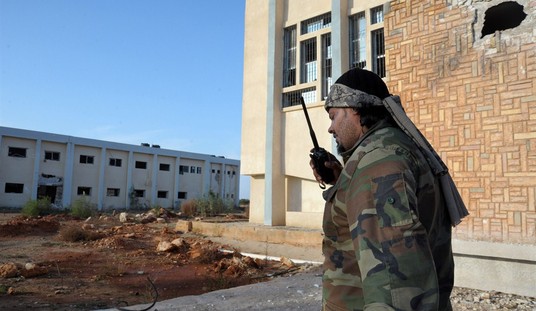Last week, President Barack Obama was at the United Nations, wining and dining the international do-gooder set and doing the grip and grin with friends, adversaries, and those who can’t quite make up their minds. He gave a lovely speech to the General Assembly, speaking in glowing terms of international cooperation to deal with the world’s problems, and he chaired a meeting of the Security Council where one and all solemnly promised to work toward a world where Albert Einstein’s ruinous equation E=MC2 would be conveniently forgotten and mankind would be forever saved from the prospect of nuclear annihilation.
Both the speech and the song and dance at the Security Council meeting were illustrative of the sad fact that the United Nations is not a place where serious issues are addressed, much less resolved. While Obama talked non-proliferation and a nuke-free world, he was also fully aware that one of the UN’s member states was thumbing its nose at the world and constructing a secret uranium enrichment facility that was giving the lie to its oft-repeated promises that its nuclear program is for “peaceful” purposes only.
It is not logical or reasonable to assume that Iran has not been engaged in the dreaded “parallel fuel cycle” approach to their enrichment program. While their main facility for enriching uranium at Natanz was under the eyes of the International Atomic Energy Agency and producing low-grade uranium suitable for nuclear reactors, the Iranians were secretly building one — or more — facilities that, for safety’s sake, we must assume was going to be used to enrich uranium to levels suitable for bomb-making, else why keep it secret?
And yet, world leaders at that Security Council meeting (most of whom were fully aware of the secret Iranian facility) pretended that dismantling their bombs and missiles would somehow remove the nuclear threat from the world, and we would all live happily ever after.
We like to think that this is simple naivete on the part of our president and the other leaders present. This is not a credible analysis given what these ladies and gentleman know from their own intelligence briefings regarding what is happening in Iran, and North Korea as well. Instead, they found it a pleasant diversion to pretend that the disagreeable reality represented by the Iranian threat simply didn’t exist.
In case you haven’t noticed, this is par for the course at the UN. You may recall during the last decade, the United Nations refused to call what was happening in Darfur “genocide” despite hundreds of thousands being murdered. You also may remember that the UNIFIL force (United Nations Interim Force in Lebanon) was supposed to keep the political party/terrorist group Hezbollah from rearming after their war with Israel in the summer of 2006 — as futile a mission ever designed given the fact that the Party of God has been resupplied by their Iranian benefactors to the tune of 40,000 rockets. And it was done right under UNIFIL’s noses.
The disheartening corruption that permeates the world body, the cronyism, the waste, the fraud, the Oil for Food scandal — all of this pales in comparison to the consequences of what will happen if the United Nations does not get deadly serious about the Iranian nuclear program and do all in its power to stop it.
But this is a body that only gets “deadly serious” about making sure the napkins match the curtains at any of the endless diplomatic soirees that help kill the boredom of life at the UN. In order to get serious about denying Iran the ultimate means of assuring that no one will ever again insult the prophet by portraying him in silly little cartoons, the world would have to face some unpleasant truths. And since the UN is all about burying unpleasant truths underneath an avalanche of platitudes and meaningless drivel, the chances of any concerted effort by the world community to stop the Iranians are between slim and none.
The number one unpleasant truth the UN refuses to face is that the Iranians are not going to stop their drive for developing the capability to build a nuclear weapon unless someone physically restrains them from doing so. President Mahmoud Ahmadinejad has made this perfectly plain and there should be no reason to doubt him. He has tied the Iranian nuclear program to the issue of Iranian sovereignty and demands the same rights any other nation has to a nuclear program granted under international law.
The “P-5 + 1” talks (the five permanent members of the Security Council plus Germany) in Geneva will simply confirm what everyone already knows: no sanctions regime will prevent Iran from continuing their nuclear work. There are no enticements, no blandishments that the Iranians will accept in exchange for abandoning what they clearly see is a matter of national pride and international prestige. To think otherwise is not logical.
There have been all manner of grandiose proposals for a “grand bargain” that would establish a multinational enrichment facility on Iranian soil, or a vastly increased inspection regime by the IAEA, in exchange for inducements to Iran that consist of sponsoring Iranian membership in the WTO to increased trade with the West.
But when Iran refuses, what then? And here is where I think it fairly obvious that the United States, the West, and the rest of the world have already accepted the idea that Iran is going to eventually develop the capability to construct a nuclear bomb.
And what of Israel? The Israeli ambassador to the United States had this to say during an address to congregants in Washington during Yom Kippur services:
“The government of Israel has supported [Obama’s] position on engagement with Iran. It was not an easy position to adopt,” Oren told the fasting congregants. “We see a clock ticking on the wall, but we support it, with assurances that this will not be an open-ended process, that by the end of the year, the [U.S.] administration will have a good idea about where Iran stood on this process, and that failing to persuade Iran diplomatically to stop enriching uranium on its soil, the United States would lead the international effort to impose crippling sanctions on Iran.”
The ticking clock is a useful metaphor for Israel’s patience. There are many in Israel’s defense establishment who believe that the Iranians are just months away from being able to threaten the existence of the Jewish state. The “wait and see” attitude by the Israeli government is in deference to the cold hard fact that even a massive strike by the Israeli Air Force would fail to slow down the Iranian nuclear program, perhaps buying breathing room measured in months or a few years. That was the conclusion reached a few years ago by the United States as reported in this 2006 article in the TimesOnline:
The White House’s earlier enthusiasm for military strikes if all else failed has cooled after warnings from the Pentagon and intelligence analysts that the risk to reward ratio of taking action was too high. At best 80% of the targets are mapped out and then only sketchily. The “collateral damage” to civilians could be considerable, sources say.
“Unless you can be 100% effective and set the programme back by two decades, you’ll just get a short-term delay and you may not produce a result that is better than the current one,” an intelligence analyst said.
Up until that time, the U.S. had deployed several carrier battle groups to the Persian Gulf and Eastern Mediterranean. But over the next nine months, forces were drawn down and additional efforts were made in the UN to add another round of sanctions on Iran.
Did something happen at the highest levels of the Bush administration that made military action against the Iranians recede as an option? That could easily be one interpretation of the apparent shift in emphasis from military action to negotiations.
But with that shift must have come the realization — the same realization that the Obama administration is dealing with now — that no sanctions regime would stop the Iranians from continuing their enrichment program, both monitored and secret. And while the Israelis appear willing to wait until the end of the year, the scenario that unfolds at that point is chilling. Just what would the Israelis consider “crippling” sanctions?
The Iranians’ Achilles’ heel is gasoline. Despite sitting on an ocean of oil, their inadequate refining capability forces them to import up to 40% of their fuel needs. It would be a tempting target for any sanctions regime to deny the Iranians a significant portion of their fuel needs.
But to do that, President Obama well knows he must convince the Russians and the Chinese that this route is the only way to both prevent an Iranian bomb and probably an Israeli military strike on Iran that could blow up the Middle East and perhaps a good portion of the world with it.
Russia has made the right noises about increasing sanctions on Iran, but most analysts believe they would stop far short of endorsing such tough penalties on one of their most important trading partners. The same goes for China, which has a very profitable and growing trading relationship with the Islamic Republic.
In a larger sense for both China and Russia, having America constantly at loggerheads with Iran over its nuclear program suits their purposes just fine. For Putin, it keeps the price of oil high while distracting us from the Russian leader’s designs in the Caucuses and other areas. For China, keeping America busy defending its allies in the Middle East allows them free reign to continue their trading expansion into Latin America and elsewhere.
The president is fully aware of all of this, so why go back to the UN for another round of watered-down sanctions that won’t stop Iran from continuing to enrich uranium? This is another case where the fig leaf of diplomacy may be masking what we already are accepting: a nuclear Iran.
If true, this means big trouble for Israel. It could mean that for the first time in many years, Israel would go to war without the full backing of their number one ally. It probably won’t stop the Israelis from trying to take out Iranian nuclear infrastructure, but it may color other actions the Jewish state would take to defend itself.
So President Obama will give it the old college try and attempt to dissuade the Iranians from going down the path to developing nuclear weapons through diplomacy and increased sanctions, but I doubt whether his hopes are any higher than anyone else’s. Sooner or later, regardless of whether the Israelis strike or not and independent of any actions the West can take to stop them, the Iranians will develop at least the capability of building a nuclear weapon.
We have accepted this nightmare because the alternatives would be even worse and because the rest of the world refuses to act responsibly in keeping the most dangerous weapons out of the hands of religious fanatics. We will no doubt attempt to mitigate these circumstances to the best of our ability by assisting our allies in the region with their defenses. But Professor Einstein’s equation cannot be put back into his head. And the Iranians are clearly on the cusp of making that theoretical equation a harsh, dangerous reality.










Join the conversation as a VIP Member